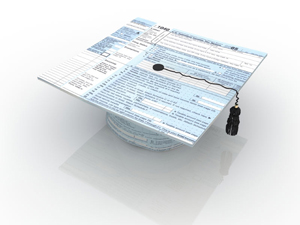Education Credits and Deductions

The American Opportunity Tax Credit (AOTC) was previously made permanent. The Lifetime Learning Credit (LLC) has again been extended under the Consolidated Appropriations Act of 2021. These credits can help offset higher education costs for the taxpayer, taxpayer's spouse or a dependent of the taxpayer claimed on the taxpayer's return. Only one of the credits may be claimed in a single tax year for each student. For example, if multiple students in a family are eligible, one student may qualify for the AOTC while another may qualify for the Lifetime Learning Credit. Alternatively, both students may qualify for the AOTC, or both may qualify for the LLC. The same student, however, cannot qualify for both credits in the same year.
American Opportunity Tax Credit
The maximum American Opportunity Tax Credit that can be taken is $2,500 per student per year. It is based on 100% of the first $2,000 and 25% of the next $2,000 of qualified higher education expense. Available for the first four years of postsecondary education (college), the AOTC is a 40% refundable credit. Even if you owe no taxes, you may still be able to receive up to $1,000.
The student must be enrolled in a program that leads to a degree, certificate or other recognized educational credential. An eligible student must be enrolled at least half time for at least one academic period. The AOTC is not allowed for any student convicted of a felony or possessing or distributing a controlled substance.
The AOTC is subject to income phase-outs based on modified Adjusted Gross Income (AGI).
Lifetime Learning Credit
The Lifetime Learning Credit is a nonrefundable credit of up to $2,000 per student. It is based on 20% of up to $10,000 of qualified expenses. Unlike the AOTC, you would not be able to receive a refund if you owe no taxes. The LLC is available to students taking courses to acquire or improve job skills in addition to those pursuing postsecondary education. It is allowed regardless of the number of courses taken. There is no limit to the number of years the LLC can be taken.
The LLC is also subject to income phase-outs based on modified AGI. The LLC phase-outs will equal those of the AOTC beginning in 2021 due to the repeal of the Tuition and Fees Deduction under the Consolidated Appropriations Act of 2021.
Related Education Deductions and Changes
The student loan interest deduction of up to $2,500 paid on qualified education loans for college or vocational school expenses, subject to a phase-out based on modified AGI similar to those for the education credits, is still available. Employers may contribute up to $5,250 annually toward an employee’s student loans from 2020 to 2025, which will be nontaxable to the employee. (Such repayments would not be deductible as student loan interest.) Certain student loan forgiveness is not taxable from 2021 to 2025.
The Tax Cuts and Jobs Act added a provision that up to $10,000 in 529 plan distributions could be used for elementary and secondary education expenses. The Tax Acts of 2019 made it possible to use 529 plans for higher education expenses for DOL registered and certified apprenticeship programs, retroactive to 2019. In addition, “The Acts” provided that, over a beneficiary’s lifetime up to $10,000 from a 529 plan could be used to pay qualified student loan repayments for the plan’s beneficiary or their sibling, starting in 2020.
Income phase-outs continue to increase for tax-free EE savings bonds used for tuition and fees for college, graduate school or vocational school for the benefit of the taxpayer, spouse or dependent.
Call us at (603) 432-0310 and let us help you maximize your higher education deductions.